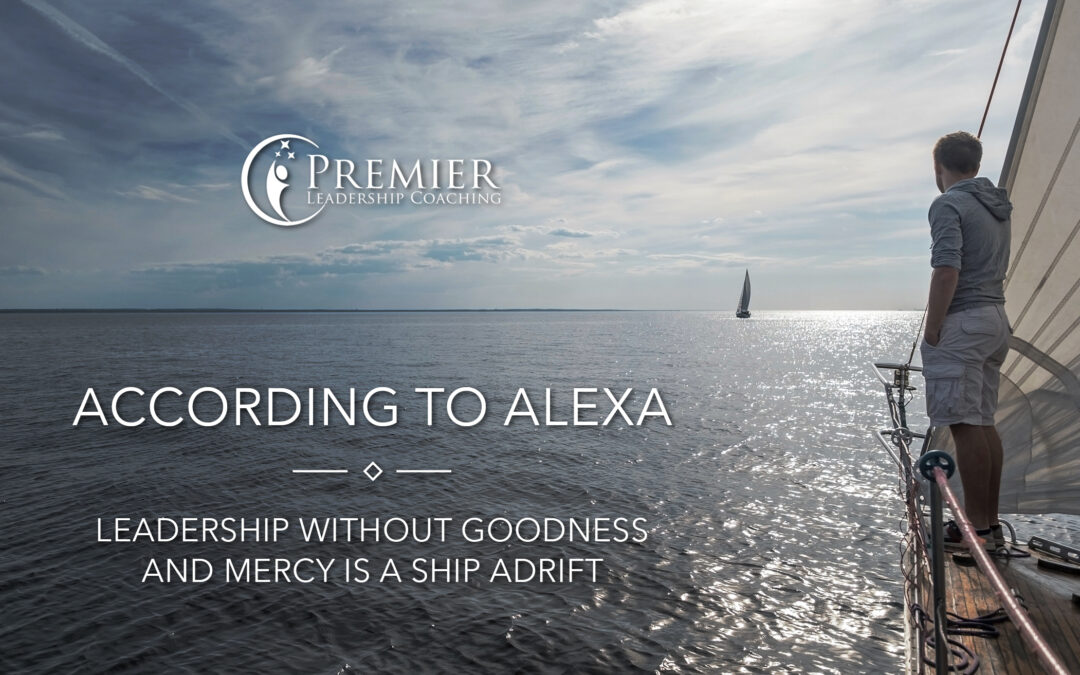Leadership Without Goodness and Mercy Is a Ship Adrift
This morning I thought of something that my closest friend from college used to say, “Alexa, you are the most religious atheist I know.”
Kate’s words came back to me when I found myself thinking about leadership and its relationship to a line from, “We Bid You Goodnight,” a song I love. “We Bid You Goodnight” has been covered time and time again and everyone who does it adds their own special touch. But in all versions, it is a partial recitation of Psalm 23. Even if you are not a religious atheist like I am you likely know this Psalm as it is quite common not only in both Jewish and Christian liturgy but also in popular culture. No bells ringing yet? Well, let me throw you a bone, “Though I go walking through the valley of death.” Ah, yeah, that one.
Anyhow, it’s not that famous line that got me thinking about leadership, but one that appears later in the Psalm. In the version of the song I was listening to, Sam Amidon sings the line as what sounds like, “Goodness and mercy shall follow me over.” Admittedly, it is a little hard to make out and it is possible that what Amidon is singing is the exact line from the Psalm, “Goodness and mercy shall follow me all the days of my life.”
In either case, I got to wondering why goodness and mercy? Of all the nouns in the English language, why would these two be the ones to follow us into the afterlife (should there be one), or why this duo for all the days of our lives? Why not two of the other 46,000 nouns? Intelligence and charisma? Kindness and generosity? Power and money? Beauty and attention? Creativity and innovation? These seem pretty good to me. In fact, they are often the ones we strive for and the ones we value. Mercy? When was the last time you heard anyone discuss mercy at work? Mercy as a leadership quality? Crickets.
Is it that these other attributes are unimportant? All of a sudden money doesn’t matter? Does status not feel good? No, I think not. Premier Leadership Coaching without income is problematic and I like being president of this place. Further, not a lot of magic happens without intelligence. A world without beauty would be unbearable. We wouldn’t get far without creativity and innovation. So, it is not that these things are insignificant. It is simply that if the slate had to be wiped clean, if all else melted away, and there could only be two things – goodness and mercy are the way to go. I have heard that if lost in the woods a knife and water purification are the most important tools to have. A fire starter is a close third and food is nice too, but the essentials, the things you cannot manage without are a knife and purification. It goes this way too with goodness and mercy for all of us, but for leaders especially so. Stationed at the helm leaders chart the course and steer the ship thereby setting the tone for the entire organization and serving as custodian of the well-being of every single worker.
Goodness and mercy aren’t the only measures, but they are the final measure. They are the anchor, the mooring, the compass, and Polaris – the tools we use to navigate leadership. If we sacrifice goodness and mercy at the altar of money, power, status, or existence-changing creativity, all of us are lost.
Avoiding this type of failure is not a hard fix. The trick is to habitually assess your actions, regularly look at the contributions you are making, explore how you are leading your organizations, and chart your path in a direction where you can maximize the goodness with which you are acting and the mercy you are extending to others. It must be part of your reflection and journey. The same way you look at budget, strategy, staffing, cost, and customer service you must evaluate goodness and mercy too. If not, we will lose the way for everyone on the boat. For if we as leaders don’t “remember right well” and do right well, who will?

